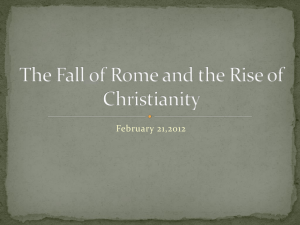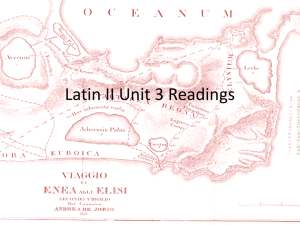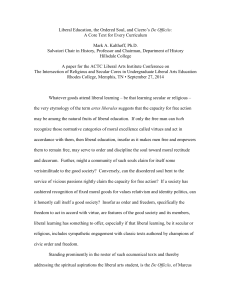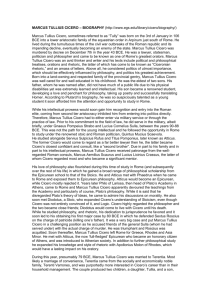Just War Tradition - University of South Alabama
advertisement
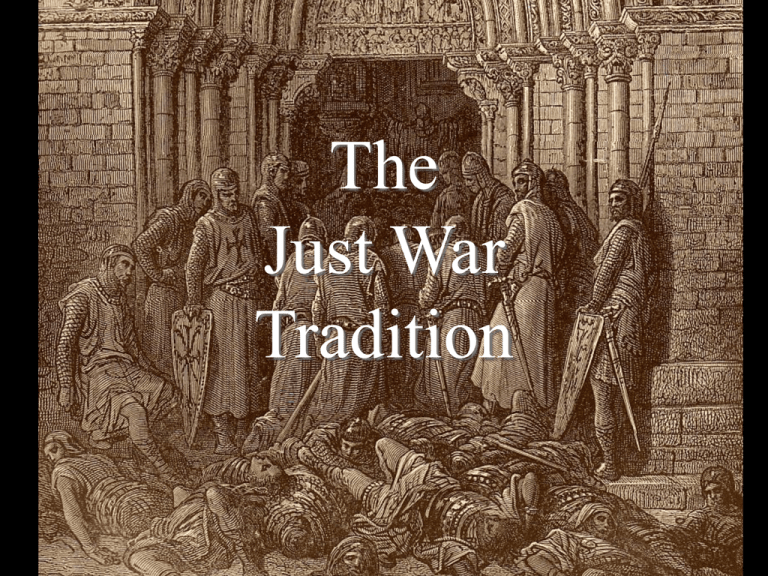
The Just War Tradition Just War Tradition Jus Ad Bellem (before the war) Jus In Bello (during the war) Jus Post Bellum (after the war) Just War Tradition Jewish contributions Two types of legitimate warfare Obligatory war (Milchemet Mitzvah) God commanded wars of the Israelites Defensive wars of any era Voluntary war (Milchemet rashut) territorial expansion Just War Tradition Contributions of Plato, Aristotle and Cicero Moral ideas discussed in Plato’s Republic “Just War” (Bellum Justum) - Aristotle in Politics. Cicero (1st century BCE) “those ware which are unjust are undertaken without provocation, for only a war waged for revenge or defense can be just.” Just War Tradition Christian Teachings 1st century CE – non-violence St. Ambrose (parallels Cicero) – lacks systematic argument based on scripture. St. Augustine – War is a consequence of sin, but could also be a remedy. Just War Tradition St. Augustine, Bishop of Hippo Ordained a priest at age 37 Ordained a Bishop after 5 years Author of “Confessions” and “The City of God” Established Just War Theory in the letter “The Correction of the Donatists” Just War Tradition Just Cause Comparative Justice Right Intention Competent Authority Public Declaration Last Resort Reasonable Probability of Success Proportionality Peace as the Ultimate Objective of War Just Cause Cicero Ambrose Augustine To defend the state from barbarian invasion To defend the safety or honor of the state To gain revenge for wrongs To defend the safety or honor of one’s allies To defend the state from barbarian invasion To defend the state from external invasion To defend the safety or honor of the state, with the realization that their simultaneous defense might be impossible To avenge injuries; to punish a nation for failure to take corrective action for wrongs (legal or moral) committed by its citizens To come to defense of one’s allies To obey a divine command to go to war (which in practice, issues from the political head of state acting as God’s lieutenant on earth) To gain the return of something that was wrongfully taken To wage war at the behest of the gods as directed by the priests of the collegium fetialium To protect those who are unable to protect themselves To obey a divine command to go to war (which, in practice, issues from the head of state acting as God’s lieutenant on earth) Comparative Justice Cicero Wars fought for “glory” are less just than those fought for defensive reasons Ambrose Augustine The nation which claims to have just cause to wage war must have a cause which is at least more just that the other nation’s cause Right Intention Cicero War must not be fought merely for territorial expansion or as the result of a lust for power or bloodshed Ambrose Augustine War must not be fought for territorial expansion Those who wage war must not delight in the wickedness of potential adversaries Those who wage war must view war as a stern necessity Those who wage war must never act in a way that will provoke war Competent Authority Cicero Ambrose Augustine The Roman Senate has authority to declare ware on behalf of the Roman people after having obtained the assent of the gods via the fetial priests. In Old Testament times, God directed wars to be fought The sovereign ruler of the state has authority to wage war. Those subject to the authority of the sovereign are dutybound to fight in the sovereign’s wars (perhaps even in those which are unjust). God can, with perfect justice direct wars to be fought. The decision to wage war is an affair of state, not the church. Public Declaration Cicero War must be preceded by: 1. A public declaration or 2. an ultimatum demanding redress of grievances. Ambrose Augustine Last Resort Cicero Ambrose By definition, a public Disputes should be declaration of war or resolved by means the issuance of an short of war ultimatum constitutes whenever possible. the last resort for peaceful resolution short of war. Augustine Disputes should be resolved by the means short of war whenever possible Reasonable Probability of Success Cicero Ambrose Augustine A war justly entered into still can be held to have been just even if it is lost. Proportionality Cicero Ambrose Augustine War must be fought in light of the object of the restoration of peace; and the restoration of peace will mark the attainment of a greater good than would result from the continued absence of peace. Peace as the Ultimate Object of War Cicero Ambrose Augustine Peace without juile is a desirable result of war. Peace should be reestablished at the war’s conclusion. Peace is the proper object of all wars. Just War Tradition Just Cause Comparative Justice Right Intention Competent Authority Public Declaration Last Resort Reasonable Probability of Success Proportionality Peace as the Ultimate Objective of War Just War in the 21st Century Warfare in the 21 Century Is Just War Reality or Myth?

